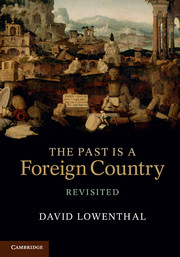Book contents
- Frontmatter
- Table of Contents
- List of illustrations
- List of permissions
- Acknowledgements
- List of abbreviations
- Introduction
- Part I Wanting the past
- Part II Disputing the past
- Part III Knowing the past
- Part IV Remaking the past
- 10 Saving the past: preservation and replication
- 11 Replacing the past: restoration and re-enactment
- 12 Improving the past
- Epilogue: the past in the present
- Select bibliography
- Index
- References
Epilogue: the past in the present
from Part IV - Remaking the past
Published online by Cambridge University Press: 05 November 2015
- Frontmatter
- Table of Contents
- List of illustrations
- List of permissions
- Acknowledgements
- List of abbreviations
- Introduction
- Part I Wanting the past
- Part II Disputing the past
- Part III Knowing the past
- Part IV Remaking the past
- 10 Saving the past: preservation and replication
- 11 Replacing the past: restoration and re-enactment
- 12 Improving the past
- Epilogue: the past in the present
- Select bibliography
- Index
- References
Summary
We live in the age of speed, immediacy, and the instantaneous. The value of a bit of information is measured not in terms of its reliability but in terms of its rapidity … The very notion of duration appears to have become unbearable. Thus, the past seems to slip away, which in turn provokes the desire to bring it back into the present.
Henry Rousso, 1998The life of the past, persisting in us, is the business of every thinking man and woman … A lifetime’s study will not make accessible to us more than a fragment of our own ancestral past, let alone the aeons before our race was formed. But that fragment we must thoroughly possess and hand on.
A. S. Byatt, 1990How is the past now seen? By what means and media is it accessed? Is it prized more or less than previously? Is it better or less well understood, clearer or more opaque? Is it more treasured or trashed, venerated or violated? Are the revisions that alter it felt desirable or deplorable? What has been expunged or invented, and why?
To generalize about global attitudes invites incredulity. If nothing else, this book has shown the overwhelming diversity of responses to what has happened, to what is inherited, to remnants and memories championed or cherished, regretted or resented. Indeed, the very facts of the past seem less and less consensual. ‘Not just polarized opinion but polarized knowledge’ spawns ‘wildly divergent accounts of the past’, observes a historian. ‘I have my past, and you have yours, and never the twain shall meet.’
- Type
- Chapter
- Information
- The Past Is a Foreign Country – Revisited , pp. 585 - 610Publisher: Cambridge University PressPrint publication year: 2015



